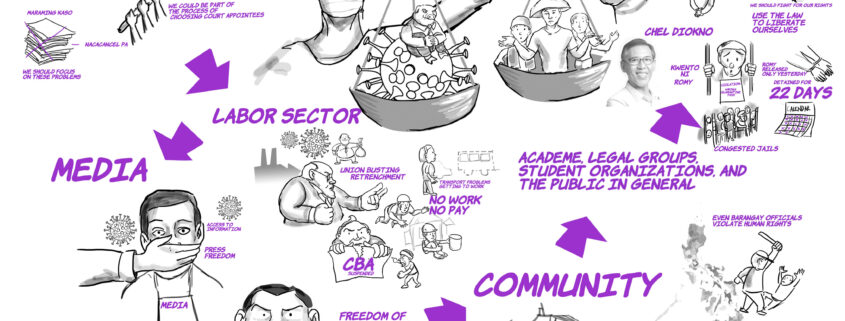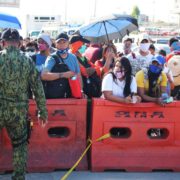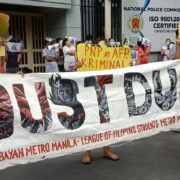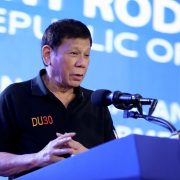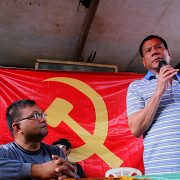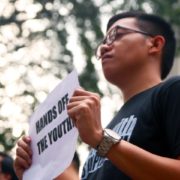Access to PH Justice System Suffers Amid the Lockdown
The pandemic is laying bare lingering issues such as abuse of power, human rights violations, lack of access to the justice system, overcrowded jails and detention centers, lack of accountability, weaponization of the law, and impunity.
BY ANGELICA CARBALLO PAGO/Philippine Center for Investigative Journalism
TWO months of lockdown have put the Philippine justice system under more stress and farther away from the reach of ordinary citizens.
Lawyers from the multisectoral network Courts Appointments Watch PH pointed to illegal or warrantless arrests, maltreatment of quarantine violators, transgression of labor laws, and a crackdown on free expression during a webinar titled “Access to Justice Under a Pandemic Crisis” on Wednesday, May 19.
Lack of legal information and access to the complex and formalistic judicial system has long been a problem for the poor and those in far-flung areas, said lawyer Sheila Formento of Alternative Law Groups (ALG).
In 2017, the Philippines had 2,200 courts, equivalent to just one court for every 50,000 people, according to figures submitted to the Association of Southeast Asian Nations.
That same year, one prosecutor handled an average 166 cases and disposed of 145 cases, according to the National Prosecution Service. At the Public Attorney’s Office, which serves indigent litigants, each lawyer handled 465 cases in 2018.
Courts constrained
Posting bail for detainees became particularly difficult, even for those with money, because of limited court operations during the lockdown.
“Even those who scraped up money for bail ay nahirapan pa rin makapagpiyansa dahil sa dami ng requirements at nahihirapan din magbayad,” said lawyer Jose Manuel ‘Chel’ Diokno of the Free Legal Assistance Group (FLAG).
(Even those who scraped up money for bail had a hard time because of so many requirements. It was also difficult to make payments.)
In some areas, bail could only be paid through state-owned Land Bank of the Philippines. Some branches were open just three times a week and for only half a day. Interbranch payments, ATM, and online banking services were not accepted.
In just a month after the enhanced community quarantine (ECQ) was enforced, the Philippine National Police (PNP) arrested 31,363 individuals, 2,467 of which were still in detention. Police filed 24,248 cases of quarantine violations.
These cases were on top of the arrests and killings under the war on drugs, which continued despite the lockdown.
“Dahil sa limitadong operasyon ng mga korte, ‘yung mga pending na kaso ay lalong made-delay at dahil madadagdagan pa ng mga violation ng ECQ, mas lalo pa itong dadami,” Formento said.
(Because of limited operations of the courts, pending cases will be further delayed, and the case loads will swell as violations of the ECQ pile up.)
Food or bail money?
Lawyers from the multisectoral network said unchecked abuses and human rights violations by law enforcers, as well as delays in the resolution of cases, have contributed to growing distrust in the judicial system among the poor and disadvantaged.
In many communities, the choice was either to post bail or go hungry, and the poor would rather spend their money on food and other necessities than file a case against abusers, ALG said.
Online initiatives to help to those in need, including remote legal advice and electronic filing of cases and bail petitions, were hampered by poor internet connection in far-flung communities and even in urban poor areas, it said.
The group has developed information materials on individual rights at checkpoints and during arrests, as well as on court procedures and other relevant issuances.
“Isang malaking hamon ang ibinigay ng pandemic na ito sa ating justice system. Bagama’t may kakulangan sa pasilidad at sa kahandaan ng organisasyon, dapat siguraduhing ang hustisya ay gumugulong para sa lahat. Kailangan ng pagmamatyag nating lahat na siguruhin ito,” Formento said.
(The pandemic is a big challenge to our justice system. Even if there’s a lack of facilities and organizational preparedness, the wheels of justice need to turn for everyone. We have to keep watch to make sure of that.)
Unwarranted arrests
Diokno said the pandemic further underscored lingering issues such as abuse of power, human rights violations, lack of access to the justice system, overcrowded jails and detention centers, lack of accountability, weaponization of the law, and impunity.
He cited instances when rules on warrantless arrests were not observed during the quarantine.
By law, warrantless arrests are allowed only in three situations: 1) when the crime is committed in the presence of police or in flagrante delicto, 2) when in hot pursuit based on personal knowledge of who committed the crime and 3) when arresting escaped prisoners.
“Unfortunately, the power to arrest without warrant has been, in my opinion, misused,” said Diokno.
Warrantless arrests have been used against people over jokes, memes, satires, and even legitimate opinions and speech on social media.
In Cebu, Bambi Beltran was arrested for posting a satirical Facebook status, and the Zambales teacher Ronnel Mas, who posted a reward to “kill” President Duterte on Twitter, was brought to Manila under questionable circumstances.
“This pandemic has exposed the flaws in our justice system,” said Diokno.
Diokno also said it was not unusual to hear of a poor person being arrested for a simple quarantine violation and then detained for more than 20 days.
FLAG also received reports that some detainees were beaten up in crowded jails, where social distancing was next to impossible, he said. (See related story: Philippine Jails are a Covid-19 Time Bomb)
Labor rights take the backseat
Job security and labor rights have also suffered as workers bore the brunt of business losses due to the lockdown, said Marco Gojol of National Union of Workers in Hotel, Restaurant and Allied Industries-Sentro (Nuwhrain-Sentro).
Gojol said many companies were poised to let go of employees with losses mounting due to extended closures. Many companies were unable to get government subsidies, he said.
“Ang isa sa pinakamalaking issues na kinakaharap ng workers ngayon ay income loss. Maraming kumpanya ang napilitang itigil ang operasyon at apektado ang maraming no-work, no-pay (na mga manggagawa),” Gojol said.
(One of the big issues faced by workers is income loss. Many companies have been forced to stop operations and workers in no-work, no-pay arrangements have been affected.)
Many employers avoided stoppage by shifting to alternative modes of work, such as work-from-home and skeletal operations, but regular employees were prioritized over contractual employees, Gojol said.
In areas under the less restrictive general community quarantine, employees had a hard time going to work because of lack of public transportation. Safety remained a question mark in the absence of mass testing for the coronavirus disease, he said.
Moreover, union-busting did not stop during the pandemic, and some workers were dismissed for demanding safe workplaces and protocols, Gojol said.
Gojol said food and beverage workers from the Sentro labor centerfiled a notice of strike due to lack of safety protocols in their workplace on May 18. The notice was received but not docketed by the National Conciliation and Mediation Board, whose operations were put on standstill by the pandemic.
Gojol called on justice system stakeholders to help the labor sector find ways to protect the fundamental rights of workers amid the Covid-19 outbreak.
He cited the Department of Labor and Employment’s Advisory 17, which encouraged workers and employees to negotiate temporary adjustments to wages and other benefits.
“Habang may pandemya, inevitable ang labor-management disputes. Paano ia-address ng mga parties ang issues ngayong ‘new normal’ at paano magwo-work iyong mga dispute resolution mechanisms in this situation?” Gojol said.
(Labor-management disputes are inevitable during the pandemic. How will the parties address these issues during the ‘new normal’ and how will dispute resolution mechanisms work in this situation?)
Media, free expression under threat
Karol Ilagan of the Philippine Center for Investigative Journalism said truth-telling and holding government to account have become even more important during the pandemic.
“The crisis is transforming the business of journalism from gathering information, reporting, research to production, publishing and broadcast. It comes at a time when our role in disseminating reliable and verifiable information and holding power to account has never been more critical,” she said.
The government’s pandemic response, however, has been accompanied by threats to press freedom, freedom of expression, and journalists’ safety. Some of these measures were meant, ostensibly, to stem the spread of disinformation, Ilagan said.
Ilagan cited the provision penalizing fake news in the “Bayanihan to Heal as One Act,” which has been weaponized to punish or stifle dissenting voices, especially those on social media.
According to a report published by the Freedom for Media, Freedom for All netowrk, at least 60 individuals have been charged by government officials on the basis of this provision of the pandemic response law. (See related story: Journalists Struggle to Cover the Pandemic as Space for Media Freedom Shrinks)
In a jab against press freedom, ABS-CBN, the country’s biggest media network, was shut down on May 5 as lawmakers allowed its broadcast license to expire under pressure from the Duterte government.
The shutdown has deprived Filipinos of access to information during the pandemic, and has jeopardized the livelihood of 11,000 network employees.
The Philippine Press Institute said over half of its members had ceased printing due to economic losses, and layoffs were expected in the next few months across media companies. ABS-CBN has said it would be forced to lay off workers by August without a new franchise.
“Reporters and newsrooms are under intense pressure during this pandemic, which is arguably the most complex story that we can cover right now. At stake is the public’s right to know at a time when the stakes are even higher,” Ilagan said.
While information about the pandemic has been made available online by various government agencies, access to other information about the inner workings of government has generally been delayed, she said.
The Presidential Communications Operations Office for a time has ordered the suspension of responding to Freedom of Information (FOI) requests during the quarantine period. Not all agencies cater to FOI requests, resulting in longer waiting times and delays for journalists looking for stories during the pandemic.
Bright spots still in sight
Ilagan said collaboration was key to tackling the difficulties and challenges posed by the Covid-19 pandemic as media and other stakeholders seek transparency and accountability in the legal system and the government.
“If we are to talk about solutions, there should be a concerted effort, particularly with the spread of disinformation. Alam nating aggressive ang nagpapakalat nito. We have to be more vigilant in providing verified and reliable info. And we have to work extra hard kasi nahihirapan tayo to do our job given the practical limitations,” Ilagan said.
Ria Nadora of the Association of Law Students of the Philippines urged the public to join in the national discourse for improved access to the justice system by using online spaces and social media.
“Not being silent about the matter helps in its own little way,” Nadora said.
Lyceum of the Philippines law dean Ma. Soledad Deriquito-Mawis, past president and chairperson of the Philippine Association of Law Schools, was optimistic of the solutions discussed during the webinar.
“This pandemic was not able to put a curse on our spirit in defending our freedoms and fighting for our rights. This pandemic did not put to sleep the Filipino spirit,” Mawis said.
= = = = =
PCIJ is a member of Court Appointments Watch PH. The CAW webinars and its coverage are made possible by the support of The Asia Foundation.— PCIJ, May 2020

